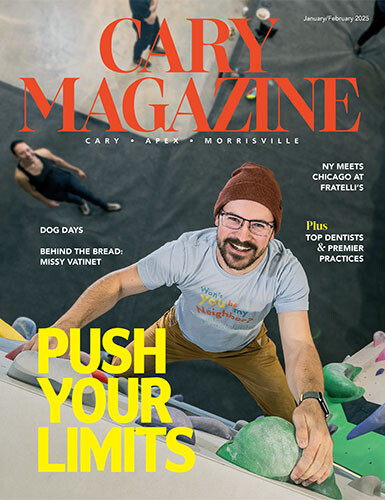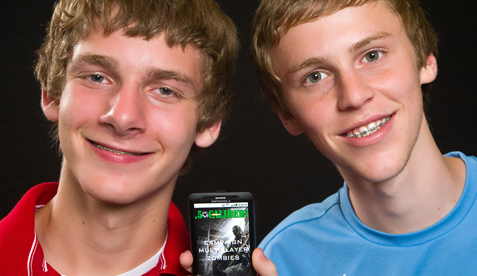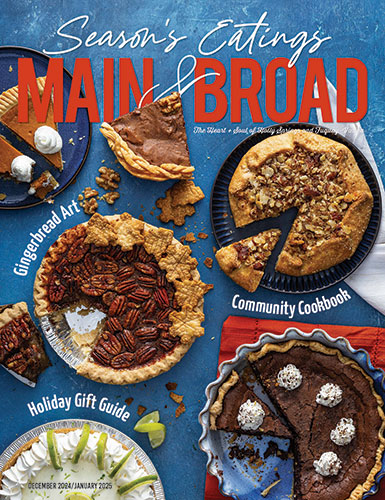Written By Jennifer Baron
For those of us who remember rotary dial phones and big yellow books that landed on the porch with a thud, the speed and breadth with which mobile phones have integrated themselves into everyday life is dizzying. But for today’s teens, the hand-held gadgets are a way of life. A necessity. An opportunity.
Three Cary Academy teens are registered application or “app” developers for the Android and iPhone. They have their own companies, websites and corporate bank accounts. They did this at the ages of 12, 15 and 16 years old.
Answering the Call
After logging hours upon hours on the Call of Duty video game franchise, Ian Henry, 16, and David Maydew, 15, both in the class of 2013, qualify as experts in the field of play. That alone doesn’t make them much different from thousands of other teenage boys. It’s their technical abilities and entrepreneurial spirit that set them apart.
After taking a computer programming course at Cary Academy and honing his skill by writing simple Droid apps for his dad’s company, Ian felt ready to strike out on his own. He teamed up with David, who is pretty much self-taught in the business of building and running websites. And they had what they thought was a pretty good idea.
“The series (Call of Duty) had been so popular and sold so many copies we thought we could ride off its popularity and create our own guidebook for it. So that’s all the app is — strategies and tips on how to be better at the game,” explained Henry.
They were right. After paying Android’s $25 fee to become an official developer, they released a free version of their app for Call of Duty: Black Ops, and it now has more than 180,000 downloads. Soon after they released a paid version, which costs 99 cents, and it made it to Top 5 in the reference category on the Droid search engine. It currently has more than 7,000 downloads.
The teenage team will excitedly explain how they were able to best their competition by supporting their app with a website, complete with Facebook and Twitter accounts and a blog. They named their company 50 Caliber Inc. after one of the guns in the series. With the help and guidance of their fathers (one is a programmer, the other an accountant) they became a registered corporation in North Carolina. They are co-CEOs and have shareholder meetings in each other’s basements.
“That’s kind of shocking actually,” mused Maydew. “And to know there are other companies that started the way we did (think Apple in Steve Jobs’ garage and Facebook in Mark Zuckerberg’s Harvard dorm room).”
Lest you think these young men are all work and no play, each keeps a busy schedule of his own. Henry balances out his work at 50 Caliber Inc. by wrestling and playing baseball for Cary Academy. Maydew plays soccer and is on the debate team. No one plans to drop out of school to develop 50 Caliber. However, they are already planning for their next app and what they hope will be a long and profitable future.
“Wherever this takes us, we now know a lot about the business world and we know how to start our own company,” said Maydew. “Those are great lessons we learned from this.”
Know-It-Ball
Cary Academy eighth grader Nick Landry will tell you he’s “good with numbers.” That’s an understatement. By age 12, Landry had already created multiple video games of his own.

But he wanted to make some cash, so he set his sights on creating an app for the iPhone. He would need to learn a new computer language and come up with a good idea. With his dad’s help, he did both. The result is an app called Answer iBall, a high-tech version of the old Magic 8 ball.
“It just occurred to me that it would be a good idea to make it because I liked it so much that other people would like it if it was a funny little app,” explained Landry.
Funny, indeed. The dancing eyeball with its arms and legs waving and a catchy little tune playing in the background is a bit addictive, just like its predecessor. Landry wrote the program so that users ask it a yes-no-maybe question, then shake the iPhone or iPad and hear a random answer. The high-pitched answers are Landry’s voice filtered through a voice mixer; the sinister low-pitched answers are his dad’s modulated voice.
After going through an extensive submission process, the then-seventh-grader became a licensed developer for Apple in 2010. His 99-cent app has been downloaded more than 600 times.
The game plan for self-named TechNick Software is to come up with the next big app kids will think is fun, like Angry Birds. He admits, coming up with something original and catchy is tough. But as the president of his own company, this notable teen is undaunted.
“The big thing I learned is that you can do anything you set your mind to,” he sagely advised.





